February 4th, 2016
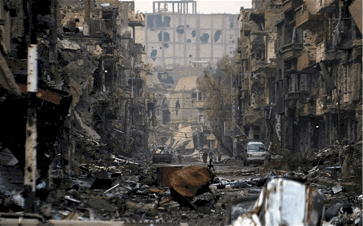
Source: Telegraphy/UK
On January 21, 2016 I listened to a webinar hosted by AACRAO concerning Syria and supporting refugee access to higher education. The presenters, Annetta Stroud, Senior Evaluator at AACRAO and Monica Ibrahim, EducationUSA Adviser, Syria, provided a thorough overview of the current state of Syria’s education system and the severe impact of the on-going conflict on the country’s infrastructure, including schools and universities. The picture is very grim and it is difficult to envision that there is an end in sight to the fighting between government forces and those of the opposition and ISIL/Daesh. We have seen the images of the death and destruction and the hundreds of thousands of Syrian refugees fleeing their homeland to neighboring countries and Europe in search of safety and stability. The refugee camps in Iraq, Turkey, Lebanon, Jordan and Egypt have reached and exceeded their maximum capacity. UNESCO and NGOs have set up temporary schools for the children living in the refugee camps. Alternative methods of teaching have been implemented and still some students risk their lives to return to Syria just to participate in their high school final examinations. The situation is grim to say the least and lives have been disrupted and an entire population of people traumatized and displaced beyond levels we can ever comprehend.
https://www.youtube.com/watch?v=TZRLvbgaIHs
Drone image of Homs, Syria
The following are highlights of the information gleaned from the webinar as well as facts on refugees provided by UNESCO.
Brief History of Conflict
- March 2011 Syrian crisis began when anti-government protests in Deir al-Zour and Damascus broke out.
- July 2011 military defectors set up the Free Syrian Army.
- 2013 Syrian Interim Government was formed and set up its own Ministry of Education.
- 2014 ISIL had made huge gains in the region.
Status of Syria’s 7 Public Universities
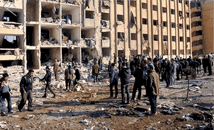
Source: Bahrain News Agency
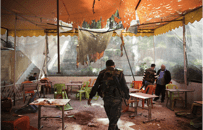
Source: NY Times
- Aleppo University – has 7 faculties in Idlib City which is under the control of the Assad Regime January 13, 2013 – 1st day of examinations at Aleppo University was disrupted by a bomb that killed 87 people, mostly students. The Ministry of higher Education suspended all exams at all higher education institutions.
- Tishreen University – is under the control of the Assad Regime, was attacked in November 2015.
- Damascus University & Syrian Virtual University – are both under the control of the Assad Regime. On March 28, 2013, Damascus University was targeted when mortar bombs landed in the College of Architecture killing 15 students, after which the University was forced to close.
- Hama University in Hama & Al-Baath University in Homs as well as elementary and secondary schools in Hama and Homs are regularly disrupted because of ongoing conflict.
- Al-Furat University in Deir al-Zour is under the control of the regime, but in the outskirts of the city ISIL/Daesh have control of region. According to the Syrian Observatory for Human Rights, one professor at the University was tortured and killed by Assad Government forces in 2014 and accused of being part of Al-Nusra Front.
Facts on Deaths and Refugees
- The Syrian human rights group reports 1,629 students have been killed by government forces as of 2014/15 with estimates of 35,000 university students unlawfully detained.
- UNHCR reports approximately 12,000,000 registered refugees from Syria scattered amongst refugee camps in Lebanon, Iraq, Turkey and Egypt. http://www.unhcr.org/emergency/5051e8cd6-56ab78229.html
News on Ministry of Education
- There are 2 governments in operation at this time in Syria: the Syrian Arab Republic (SAR) and the Syrian Interim Government.
- Because of the conflict, the MOE in SAR has placed the entire curriculum of secondary education on-line to allow for students to self-study. In this case, students will not receive a report card or transcript for each year of study. The only document they will receive is the certificate for final exams for the Secondary Baccalaureate which provides them access to tertiary education at the universities in Syria.
- SAR’s MOE makes available exam results for 2014-2016 on their website http://goo.gl/p66jF6 (this is the link to obtain exam results for the scientific track of the secondary bacc. exam) – To verify the student’s exam results, enter the person’s exam # and province, or his/her name and other info (DOB), choose either literary/ scientific stream.
- 2010/2011 – 380,000 students were enrolled in institutions of higher education throughout Syria.
Facts about university credentials
- The wall paper degree diploma is only issued at the request of the university graduate.
- Certificates of Graduation are issued more commonly than the wall paper diplomas.
- Only one primary original official transcript is issued by Syrian Universities which will have security features such as a clear tape, wet seals, and stamps.
- Additional certified copies are available to students and to receive them they have to take the originals to the institution which will make the duplicate copies and place the wet seals and stamps. [NOTE: Certified copies need to have the wet seals from the university itself and not just the Ministry of Foreign Affairs.]
Facts about elementary and secondary students
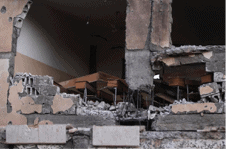
Source: Al-Jazeera News
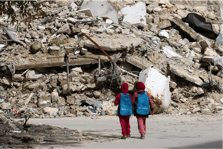
Source: Japan Times
- Under the current state of conflict, school children on the average have been out of school for 4 or more years.
- Enrollment rates of children at school in Aleppo is at 6%
- We’ll definitely see huge gaps in school attendance at elementary and secondary levels.
- In areas that are controlled by the SAR government, the MOE is seriously committed to providing students access to elementary and secondary education and continues to administer grade 9 and grade 12 leaving certificate exams.
- These exams are administered only in the areas that are under the control of the SAR government. They are not accessible in the contested areas.
- In the SAR/government controlled areas, there is a huge population of displaced people; many displaced students can’t register for schools because they don’t have their papers, ID/birth certificates and prior school records.
- MOE is now allowing students without papers to register at schools.
- Electricity, water shortages in schools hinders regular classes and attendance. It’s also forcing a double shift approach to instruction. There will be 2 cohorts as a result of this double shift instruction which means classroom instruction hours have been shortened to fit the 2 cohort class schedules.
Education in regions under SYRIAN INTERIM GOVERNMENT (SIG)
- The SIG has formed its own MOE which is called the Higher Commission for Education (HCE).
- They have revised the Syrian national curriculum and removed the following courses: National Socialist Education and History as well as any mention of the Baath party.
- The SIG HCE administers its own Baccalaureate examination in those regions of Syria which are under the control of the opposition party as well as in refugee camps in Turkey, Jordan, Lebanon and Iraq.
- Approximately 10,000 students have taken this Bacc exam by the SIG’s HCE each year starting in 2013.
- They use a different grading system and include a barcode on the Bacc certificate for security measures.
- The SIC Bacc certificate is not recognized by the SAR government and would not grant admission to universities in Syria.
- The Turkish government has recognized the SIG HCE Bacc certificate.
- The French Foreign Ministry has accepted this credential from 10 refugees to date who have been admitted to 1 university in France (name of French university is unavailable).
- No other nation has recognized the SIG and the SIG HCE Bacc Certificate.
- The non-governmental organization known as Syrian Commission for Education has been administering the Libyan curriculum to refugees in Turkey in 2013, 2014, 2015. The students take the Libyan National Leaving Examination.
- Refugees in Turkey can decide if they want to opt for the Libyan National Leaving Exam or the Syrian Bacc administered by SIG’s HCE.
- Most Syrian refugees don’t take the Turkish curriculum for secondary education because of language barriers.
- Some Syrian refugee students return to government-controlled regions in Syria to take the exam by the SAR’s MOE which is very risky.
- At universities, may students study at home and go to campus only to take exams.
- Many universities have closed their main campuses and moved offices and classes to less risky locations and offer classes from homes and apartments.
It is anticipated that with the large numbers of students preparing for the SIG Baccalaureate high school examinations in refugee camps, we will begin to see these credentials for evaluation and admission to U.S. colleges and universities. Since the SIG baccalaureate examination certificate is not recognized by the SAR Ministry of Education and the international community, except for Turkey and the French Foreign Ministry, it would be interesting to see how the academic community in the U.S. will interpret and handle this credential. We will keep you updated on any new developments that concern the Syrian education. Please join us on our FaceBook page and follow us on Twitter. Stay tuned and connected.

Jasmin Saidi-Kuehnert is the President and CEO of the Academic Credentials Evaluation Institute (ACEI).

The Academic Credentials Evaluation Institute, Inc. (ACEI), was founded in 1994 and is based in Los Angeles, CA, USA. ACEI provides a number of services that include evaluations of international academic credentials for U.S. educational equivalence, translation, verification, and professional training programs. ACEI is a Charter and Endorsed Member of the Association of International Credential Evaluators. For more information, visit www.acei-global.org.

1 reply added